DELL W3202MC User Manual [fr]
Dell™ LCD TV
Owner’s Manual
Model W3202MH and W3706MH
w w w . d e l l . c o m | s u p p o r t . d e l l . c o m

Notes, Notices, and Cautions
NOTE: A NOTE indicates important information that helps you make better use of your TV.
NOTICE: A NOTICE indicates either potential damage to hardware or loss of data and tells you how to avoid the problem.
 CAUTION: A CAUTION indicates a potential for property damage, personal injury, or death.
CAUTION: A CAUTION indicates a potential for property damage, personal injury, or death.
____________________
Information in this document is subject to change without notice. © 2005 Dell Inc. All rights reserved.
Reproduction in any manner whatsoever without the written permission of Dell Inc. is strictly forbidden.
Trademarks used in this text: Dell, the DELL logo, Dimension, OptiPlex, Inspiron, Latitude, Dell Precision, DellNet, TrueMobile, PowerApp, PowerEdge, PowerConnect, and PowerVault are trademarks of Dell, Inc.; EMC is a registered trademark of EMC Corporation.
Other trademarks and trade names may be used in this document to refer to either the entities claiming the marks and names or their products. Dell Inc. disclaims any proprietary interest in trademarks and trade names other than its own.
August 2005 |
Rev. A00 |

Contents
1About Your TV
Front View. . . . . . . . . . . . . . . . . . . . . . . . . . . . . . . . . . . . . . . . . . . . . . . . . . . . . . . . . . . . . . . 5
Left View . . . . . . . . . . . . . . . . . . . . . . . . . . . . . . . . . . . . . . . . . . . . . . . . . . . . . . . . . . . . . . . . 6
Bottom View. . . . . . . . . . . . . . . . . . . . . . . . . . . . . . . . . . . . . . . . . . . . . . . . . . . . . . . . . . . . . 7
Package Contents . . . . . . . . . . . . . . . . . . . . . . . . . . . . . . . . . . . . . . . . . . . . . . . . . . . . . . . . 8
2Setting Up Your TV
Proper Location for Your TV . . . . . . . . . . . . . . . . . . . . . . . . . . . . . . . . . . . . . . . . . . . . . . 11 Connecting Your TV . . . . . . . . . . . . . . . . . . . . . . . . . . . . . . . . . . . . . . . . . . . . . . . . . . . . . 12
3Using Your Remote Control
Installing Batteries . . . . . . . . . . . . . . . . . . . . . . . . . . . . . . . . . . . . . . . . . . . . . . . . . . . . . . 19 Using Your Remote Control . . . . . . . . . . . . . . . . . . . . . . . . . . . . . . . . . . . . . . . . . . . . . . . 20 Using Your TV With a Universal or Learning Remote Control . . . . . . . . . . . . . . . . . 22
4Using the TV Menu
Using Your Remote Control With the TV Menu . . . . . . . . . . . . . . . . . . . . . . . . . . . . . . 23
Selecting Your TV Menu Language . . . . . . . . . . . . . . . . . . . . . . . . . . . . . . . . . . . . . . . . 24
Input Select . . . . . . . . . . . . . . . . . . . . . . . . . . . . . . . . . . . . . . . . . . . . . . . . . . . . . . . . . . . . 24
Picture Settings . . . . . . . . . . . . . . . . . . . . . . . . . . . . . . . . . . . . . . . . . . . . . . . . . . . . . . . . . 25
Audio Settings . . . . . . . . . . . . . . . . . . . . . . . . . . . . . . . . . . . . . . . . . . . . . . . . . . . . . . . . . . 26
PIP/PBP/POP . . . . . . . . . . . . . . . . . . . . . . . . . . . . . . . . . . . . . . . . . . . . . . . . . . . . . . . . . . . 27
Size. . . . . . . . . . . . . . . . . . . . . . . . . . . . . . . . . . . . . . . . . . . . . . . . . . . . . . . . . . . . . . . . . . . . 28
Parental Control. . . . . . . . . . . . . . . . . . . . . . . . . . . . . . . . . . . . . . . . . . . . . . . . . . . . . . . . . 29
Contents 3

Setup . . . . . . . . . . . . . . . . . . . . . . . . . . . . . . . . . . . . . . . . . . . . . . . . . . . . . . . . . . . . . . . . . . 30
5Troubleshooting Your TV
Troubleshooting Tips . . . . . . . . . . . . . . . . . . . . . . . . . . . . . . . . . . . . . . . . . . . . . . . . . . . . 31 General Problems . . . . . . . . . . . . . . . . . . . . . . . . . . . . . . . . . . . . . . . . . . . . . . . . . . . . . . . 32 TV Menu Messages . . . . . . . . . . . . . . . . . . . . . . . . . . . . . . . . . . . . . . . . . . . . . . . . . . . . . 35 Remote Control Problems . . . . . . . . . . . . . . . . . . . . . . . . . . . . . . . . . . . . . . . . . . . . . . . . 35 Using the Self-Test Feature when Connected to a Computer. . . . . . . . . . . . . . . . . . 36 Problems When Using the TV as a Monitor . . . . . . . . . . . . . . . . . . . . . . . . . . . . . . . . . 36
6Security Features
7Specifications for Your TV
Contacting Dell . . . . . . . . . . . . . . . . . . . . . . . . . . . . . . . . . . . . . . . . . . 45
Index. . . . . . . . . . . . . . . . . . . . . . . . . . . . . . . . . . . . . . . . . . . . . . . . . . . 63
4Contents
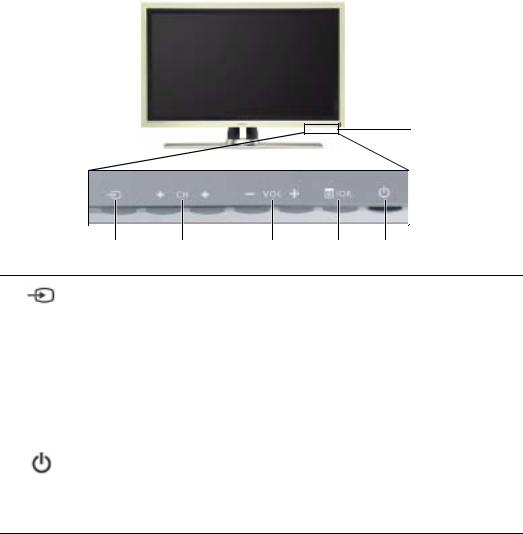
1
About Your TV
Front View
6
1 |
2 |
3 |
4 |
5 |
1 |
Input Source button |
2 Channel up/down button
Channel up/down button
3 Volume up/down button
Volume up/down button
4 Menu/OK button
Menu/OK button
5Power button and light (LED)
6IR receiver
Push to display the Input Select menu
Push to select the previous/next channel or navigate through the TV Menu
Push to increase/decrease the volume or to select an TV Menu option
Push to display the TV Menu or to confirm your selection
Push to turn the TV on and off
The power light is blue when the TV is on and amber when it is in power saving mode
Senses the signal from the remote control
About Your TV |
|
5 |
|

w w w . d e l l . c o m | s u p p o r t . d e l l . c o m
Left View
1
2
3
 4
4
1 |
S-Video connector (AV Side) |
Connect devices such as a video game system, a digital camera, |
|
|
or a DVD player |
2 |
Composite video connector |
Connect devices such as a VCR or DVD player |
|
(AV Side) |
|
3 |
Audio connector (Left) |
Use this connector if you have connected a device to the |
|
|
composite video connector or the S-Video connector |
4 |
Audio connector (Right) |
Use this connector if you have connected a device to the |
|
|
composite video connector or the S-Video connector |
|
|
|
6About Your TV
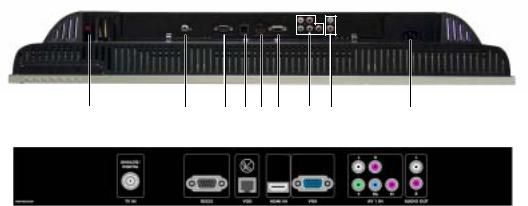
Bottom View
1 |
2 |
3 |
4 |
5 |
6 |
7 |
8 |
9 |
1 |
TV Speaker out connectors |
Connect speakers |
2 |
TV IN connector |
Connect an antenna or a cable TV box using the coaxial cable |
|
(Analog/Digital) |
(It is a Digital/Analog combo tuner) |
|
|
|
3 |
RS232 connector |
For factory use only |
4 |
VOD connector |
Connect to the Ethernet cable for Video On Demand(VOD) |
5 |
HDMI IN connector |
Connect devices such as a DVD player or set-top box |
6 |
VGA connector |
Connect your computer using a VGA cable |
|
|
*The component audio connectors(AV1 IN - L/R) is shared by |
|
|
Component and VGA |
7 |
Component audio and |
Connect devices such as a DVD player, set-top box, or cable TV box |
|
video connectors (AV1 IN) |
*This Audio L/R pair is shared by Component and VGA |
8Audio-out connectors (L/R) Connect a device such as a VCR if you have connected an antenna or
cable TV through the TV IN connector
9 Power connector |
Connect your power cord |
|
|
About Your TV |
|
7 |
|
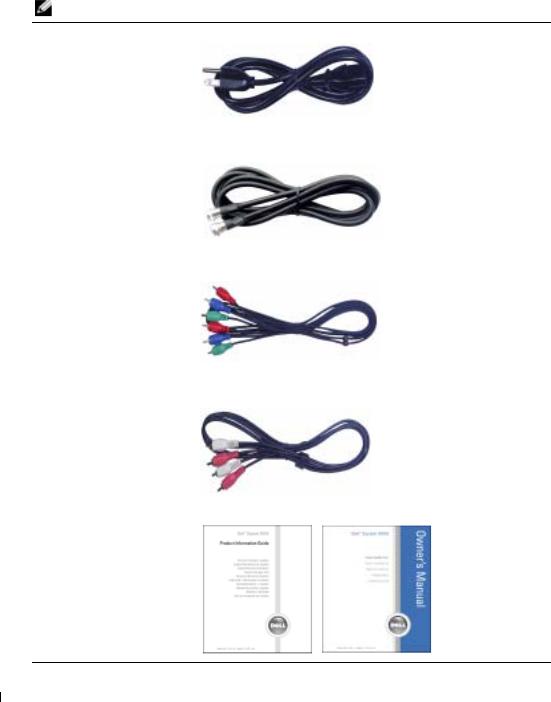
w w w . d e l l . c o m | s u p p o r t . d e l l . c o m
Package Contents
NOTE: If you need additional cables, contact Dell.
Power cord
Antenna (coaxial) cable
Component cable
RCA Audio (L/R) cable
Documentation
8About Your TV

Caring for Your TV
CAUTION: Only a licensed technician should service the TV. Do not disassemble the TV. CAUTION: Before cleaning the TV, unplug it from the electrical outlet.
•To clean the surface of the panel, lightly dampen a soft, clean, lint-free cloth with water.
•To clean the TV cabinet, use a cloth lightly dampened with a mild detergent.
•Do not use chemicals such as benzene, thinner, ammonia, or any type of abrasive cleaner.
•Do not use compressed air to clean the TV.
About Your TV |
|
9 |
|

w w w . d e l l . c o m | s u p p o r t . d e l l . c o m
TV Your About 10

2
Setting Up Your TV
CAUTION: Before you begin any of the setup procedures described in this section, follow the basic safety instructions located in the Product Information Guide.
Proper Location for Your TV
Consider the following environmental factors when you are deciding where to put your TV:
•Ensure you allow adequate ventilation.
•Do not store or use the TV in locations that are exposed to high heat, high humidity, dusty environment, direct sunlight, or extreme cold.
•Avoid moving the TV between locations with extreme temperature differences. For more information, see Specifications on page 41.
•Do not subject the TV to severe vibration or high impact conditions. Do not place the TV inside a car trunk.
•Do not place the TV in a location where water or other liquids could spill on or into the TV.
Setting Up Your TV |
|
11 |
|
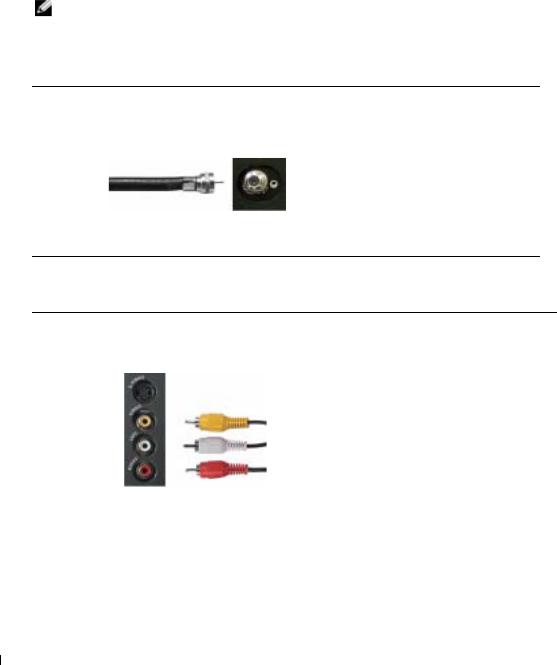
w w w . d e l l . c o m | s u p p o r t . d e l l . c o m
Connecting Your TV
The tables below provide a description of the connectors on your TV to help you decide which connectors to use for your various video devices.
NOTE: Before you connect your TV , ensure you have all the proper cables. Some cables may come with the device you are connecting. For a list of cables that came with your TV, see Package Contents on page 8. To order additional cables, contact Dell.
Connecting Your Cable TV Box or Antenna
Quality |
Cable and Connector |
When to Use |
|
|
|
Good |
Coaxial cable / TV IN |
Coaxial (RF) cable carries the analog/digital |
|
|
video and audio signal from the antenna or |
|
|
cable connector to your TV. The coaxial |
|
|
connector is labeled TV IN (Analog/Digital). |
|
|
To locate the TV IN connector, see "Bottom |
|
|
View" on page 7. |
Connecting Your Video Devices
Quality |
Cable and Connector |
When to Use |
|
|
|
Good |
Composite cable / Video, Left, Right |
The composite connector carries the video signal |
|
|
through a single pin. If you are using a composite |
|
|
video connector, you also need to connect |
|
|
composite audio cables. To locate the composite |
|
|
connector, see "Left View" on page 6. |
12 Setting Up Your TV
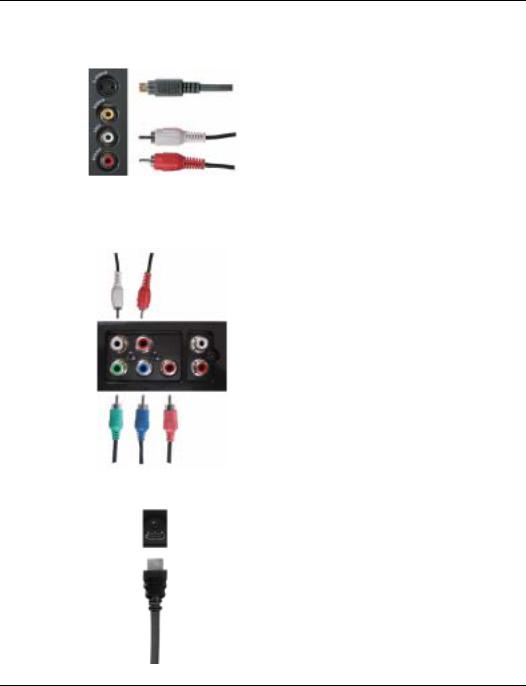
Quality |
Cable and Connector |
When to Use |
|
|
|
Better |
S-Video cable / S-Video, Left, Right |
The S-Video connector splits the video signal into |
|
|
two signals, black-and-white and color. If you are |
|
|
using the S-Video connector, you also need to |
|
|
connect the audio cables. To locate the S-Video |
|
|
connector, see "Left View" on page 6. |
Best |
Component (YPbPr) cable / AV1 IN |
The component connectors split the video signal |
|
|
into three signals, two color and one black-and- |
|
|
white. If you are using the component |
|
|
connectors, you also need to connect the audio |
|
|
cables. To locate the component connectors, see |
|
|
"Bottom View" on page 7. |
Excellent HDMI cable / HDMI IN |
HDMI (High Definition Multimedia Interface) |
|
assures that the best video signal is always sent |
|
from source (HDTV signal, DVD player) to the |
|
TV. This is achieved by allowing uncompressed |
|
video and multi-channel audio data to be sent to |
|
the display device through a single cable. To |
|
locate the connector, see "Bottom View" on |
|
page 7. |
Setting Up Your TV |
|
13 |
|
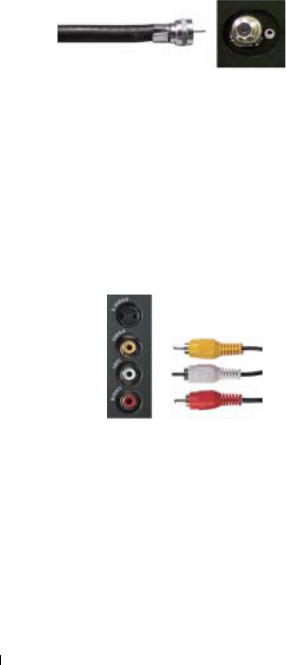
w w w . d e l l . c o m | s u p p o r t . d e l l . c o m
Using the TV IN Connector (Coaxial)
1 Turn off the TV and unplug the power cord.
2 Connect the coaxial cable to the TV IN connector on the TV. 3 Plug in the power cord for the TV and turn on the TV.
4Enter the TV Menu and select TV or Digital TV. See "Input Select" on page 24 for more information.
Using the Composite Connector
1 Turn off the TV and unplug the power cord.
2 Connect your device to the TV using the audio and video cable. 3 Plug in the power cords for the TV and devices and turn them on.
4Enter the TV Menu select AV SIDE(Composite). See "Input Select" on page 24 for more information.
14 Setting Up Your TV

Using the S-Video Connector
1 Turn off the TV and unplug the power cord.
2 Connect your device using the S-Video and audio cables.
3 Plug in the power cords for the TV and devices and turn them on.
4Enter the TV Menu and select AV SIDE(S-Video). See "Input Select" on page 24 for more information.
Using the Component Connectors
1 Turn off the TV and unplug the power cord.
2 Connect your device using the component video and audio cables. 3 Plug in the power cords for the TV and devices and turn them on.
4Enter the TV Menu and select the AV1 (Component). See "Input Select" on page 24 for more information
Setting Up Your TV |
|
15 |
|
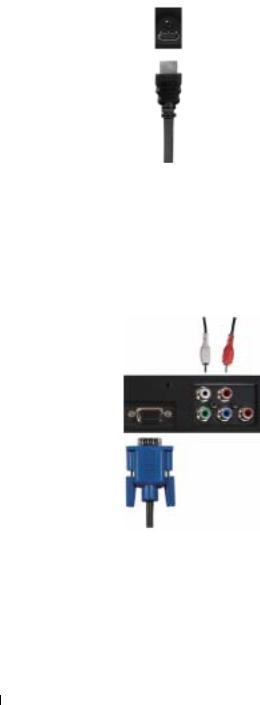
w w w . d e l l . c o m | s u p p o r t . d e l l . c o m
Using the HDMI Connector
1 Turn off the TV and unplug the power cord.
2 Connect your device using the HDMI connector.
3 Plug in the power cords for the TV and devices and turn them on.
4Enter the TV Menu and select the HDMI. See "Input Select" on page 24 for more information.
Using the VGA Connector
1 Turn off the TV and unplug the power cord.
2 Connect the blue VGA cable to your TV and to your computer.
3Connect the RCA stereo audio cable (stereo jack to RCA jack cable) to the AV1 IN audio connectors(L/R) on the TV and to your computer.
4 Plug in the power cords for the TV display and devices and turn them on.
5 Enter the TV Menu and select the VGA. See "Input Select" on page 24 for more information.
16 Setting Up Your TV

Using the VOD Connector
1 Turn off the TV and unplug the power cord.
2 Connect the Ethernet cable to the VOD connector on the TV. 3 Plug in the power cords for the TV and turn on the TV.
Setting Up Your TV |
|
17 |
|

w w w . d e l l . c o m | s u p p o r t . d e l l . c o m
TV Your Up Setting 18
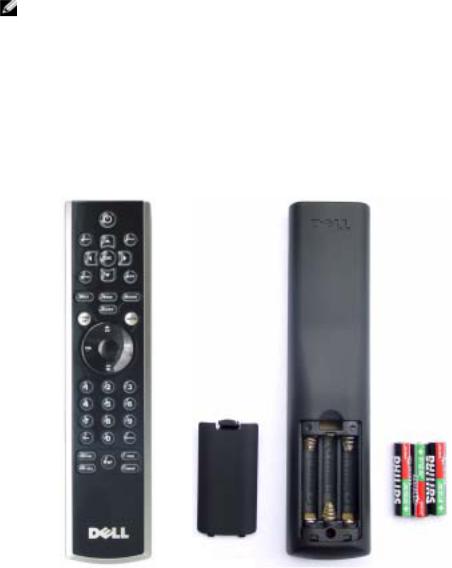
3
Using Your Remote Control
NOTE: The remote control for your Dell™ TV is an optional. If you would like to purchase a remote control, contact Dell.
Installing Batteries
Before you can use your remote control, install three-AAA batteries. 1 Slide open the battery cover.
2Install the batteries. Make sure that you match the + and - on the batteries with the + and - symbols in the battery compartment.
3 Replace the battery cover.
Using Your Remote Control |
|
19 |
|
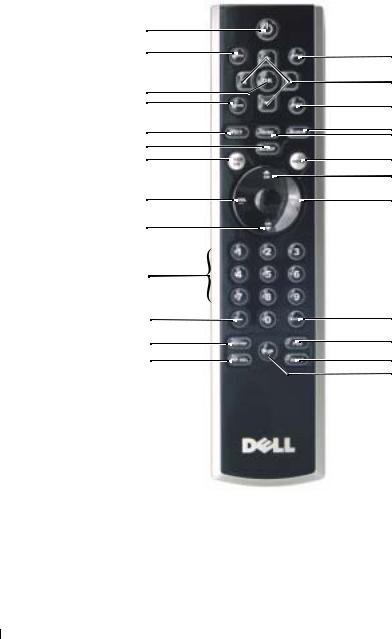
w w w . d e l l . c o m | s u p p o r t . d e l l . c o m
Using Your Remote Control
1 |
|
|
2 |
14 |
|
3 |
15 |
|
|
||
4 |
16 |
|
5 |
17 |
|
18 |
||
6 |
||
19 |
||
7 |
||
|
20 |
|
8 |
21 |
|
9 |
|
|
10 |
|
|
11 |
22 |
|
12 |
23 |
|
13 |
24 |
|
|
25 |
20 Using Your Remote Control
1 |
Power |
Turns the TV on and off |
|
|
|
2 |
MENU |
Enters and exits the TV Main Menu |
|
|
|
3 |
OK |
Press to confirm your selection |
|
|
|
4 |
GUIDE |
Displays an electronic program guide when using Digital TV |
|
|
NOTE: Content may vary depending on the broadcaster. |
|
|
|
5 |
PICT |
Cycles through the preset options for the Picture menu |
|
|
|
6 |
SLEEP |
Turns on the sleep timer |
|
|
|
7 |
PREV CH |
Returns you to the previously viewed channel |
|
|
|
8 |
Vol - |
Decreases the volume |
|
|
|
9 |
CH down |
Push to view the previous channel |
|
|
|
10 |
Number buttons |
Press to select a channel |
|
|
|
11 |
- (dash) |
Press to select the sub-channel of Digital TV |
|
|
|
12 |
POP/PBP |
Enters and exits POP or PBP mode |
|
|
|
13 |
PIP SEL |
Toggles between windows when you use Picture-in-Picture |
|
|
(PIP), Picture-Outside-Picture (POP), or Picture-By-Picture |
|
|
(PBP) |
|
|
|
14 |
INPUT |
Enters the Input Select menu |
|
|
|
15 |
Arrow buttons |
In the TV Menu, use to navigate through the menus |
|
|
|
16 |
INFO |
Displays information about your TV and channel you are |
|
|
watching |
|
|
|
17 |
AUDIO |
Cycles through the preset Audio options |
|
|
|
18 |
WIDE |
Cycles through the size (aspect ratio) options from the Picture |
|
|
Settings menu |
|
|
|
19 |
MUTE |
Press to turn the sound on and off |
|
|
|
20 |
CH up |
Push to view the next channel |
|
|
|
21 |
Vol + |
Increases the volume |
|
|
|
22 |
ENTER |
Press to confirm the channel frequency entry |
|
|
|
23 |
POS |
Press to change the position of the PIP, POP, or PBP window |
|
|
|
24 |
SWAP |
Swaps images when using PIP, POP, or PBP |
|
|
|
25 |
PIP |
Enters and exits PIP mode |
|
|
|
Using Your Remote Control |
|
21 |
|

w w w . d e l l . c o m | s u p p o r t . d e l l . c o m
Using Your TV With a Universal or Learning Remote Control
Preprogrammed universal remote controls can be programmed to control the following functions on your Dell TV:
•Power
•Channel Up (+)
•Channel Down (-)
•Volume Up (+)
•Volume Down (-)
•Mute
•Input Select
NOTE: Future preprogrammed universal remote controls may be able to control more functions.
You can program universal remote controls to work with your Dell TV in the following ways:
•If the remote control manual lists codes by manufacturer, use the Philips codes.
•If the remote control has a search function, this function may be used to find the correct code.
•If the remote control has a learning function, you can program specific buttons on it from the Dell remote control, in addition to those buttons listed above.
NOTE: For additional information, see the documentation that came with your universal or learning remote control.
22 Using Your Remote Control
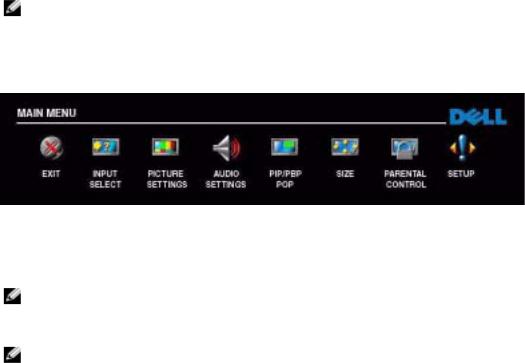
4
Using the TV Menu
Your TV has the TV Menu that allows you to select the proper input source, make adjustments to the image and audio settings, select to view Picture-In-Picture, Picture-Outside-Picture, and Picture-By-Picture, and set parental controls.
Using Your Remote Control With the TV Menu
NOTE: You can access and make selections to the TV Menu using the volume and channel buttons on the front panel of the TV or you can use the remote control. Except where noted, this section describes how to use the TV Menu with the buttons on the front panel of the TV.
1To enter the TV Menu, press the Menu button. Eight icons appear along the bottom of the screen.
2Use the volume up and down buttons to move between the icons. The icon appears highlighted and a new menu appears as you move through the menu.
3 To select an option, push the OK button when the icon is highlighted.
4 Use the channel up and down buttons to move through the various settings.
NOTE: A red arrow appears next to the setting as you navigate through the options. A check mark appears next to the option that you have selected.
5 Use the volume up and down buttons or the OK button to adjust or select settings.
NOTE: You can select Exit or press the Menu button at any time to return to the main menu.
6 After you have made your selections, push the Menu button to return to the main menu. 7 To exit the TV Menu, select the Exit icon and press the OK button.
Using the TV Menu |
|
23 |
|
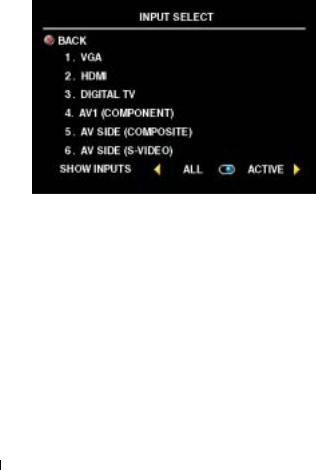
w w w . d e l l . c o m | s u p p o r t . d e l l . c o m
Selecting Your TV Menu Language
1 Press Menu to enter the TV Menu.
2 Select Setup.
3In the Setup menu, select Language and scroll to select the language that you want the TV Menu to appear in.
Input Select
The Input Select menu allows you to select the proper source based on how you have your TV and video equipment connected. Press Input Source button on the front panel to go directly to the Input Select menu. You can also press Menu and select Input Select from the main menu.
If you are using the Digital TV input source, you can preset the viewable channels. Go to the Main Menu, select Setup, select Channel Setup, and then select Channel Search. If you are using the TV IN connector, you need to preset the viewable channels for the Digital TV input source.
VGA — Select when you have your computer connected to the VGA connector. See "Bottom View" on page 7 for the location of the VGA connector.
HDMI — Select when you have connected a device, such as a DVD player using the HDMI connector. See "Bottom View" on page 7 for the location of the HDMI connector.
DIGITAL TV — Select when you have your antenna connected to the TV IN connector. See "Bottom View" on page 7 for
the location of the TV IN connector.
AV1 (COMPONENT) — Select when you have a video device, such as a DVD player, set-top box, or cable TV box connected to the component audio and video connectors on the bottom of the TV. See "Bottom View" on page 7 for the location of the component audio and video connectors (AV1 IN).
AV SIDE (COMPOSITE) — Select when you have a video device, such as a video game system, connected to the composite video and audio connectors on the left side of the TV. See "Left View" on page 6 for the location of the composite video and audio connectors (Video, Left, Right).
AV SIDE (S-VIDEO) — Select when you have a video device, such as a VCR, connected to the S- Video and audio connectors on the left side of the TV. See "Left View" on page 6 for the location of the S-Video and audio connectors (S-Video, Left, Right).
24 Using the TV Menu
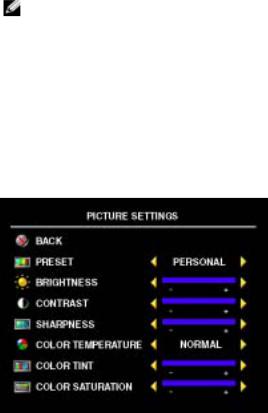
SHOW INPUTS — Show Inputs allows you to select Active and All. Active searches for which connectors are being used. The available input sources appear in white and input sources that are not available appear in grey. All shows all the input sources and allows you to select all the input sources even if you do not have a device connected.
NOTE: In TV Menu Settings, located in the Setup menu, you can set the Input Select to display the device that you have attached. For example, AV1 (COMPONENT) would say DVD when you view the Input Select menu.
Picture Settings
The Picture Settings allow you to adjust the appearance of the image including color and brightness.
If you select one of the following preset image settings the individual settings are automatically updated.
•Movies
•Sports •Weak Signal •Multimedia
If you select Personal, you can adjust the individual settings, such as Brightness and
Color.
The Color Temperature presets are:
•Natural: the native panel temperature
•Normal: 6500K
•Blue: 9300K
•Red: 5700K
Using the TV Menu |
|
25 |
|
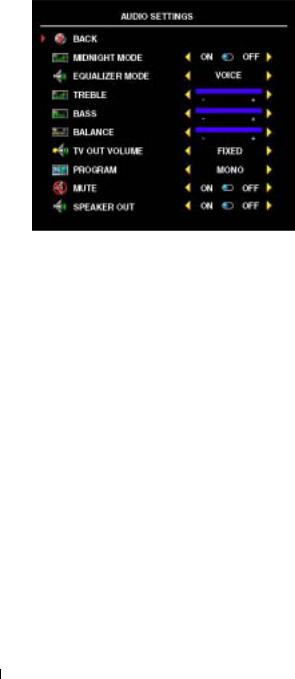
w w w . d e l l . c o m | s u p p o r t . d e l l . c o m
Audio Settings
The Audio Settings allow you to set the audio to best fit the type of show you are watching.
Midnight Mode — Evens out the large volume variations between voice and action scenes.
If you select one of the following preset Equalizer Mode settings, the individual audio levels are automatically updated:
•Music
•Theater
•Voice
If you select Personal, you can adjust the individual audio levels, such as Bass and Treble.
TV Out Volume — Select Fixed if you want to adjust the volume using the remote or volume control on an attached audio receiver. Select
Variable if you want to adjust the volume using the TV remote or front panel buttons. Using Variable adjusts the TV volume out not the volume on an attached audio receiver.
Use Program to select Stereo, Mono, or SAP (Second Audio Program).
Use Mute to turn the TV sound on or off and use Speaker Out to turn on or off sound from the speakers.
26 Using the TV Menu
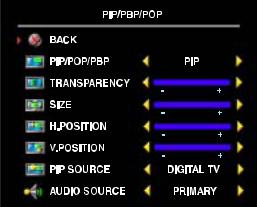
PIP/PBP/POP
You can view two active sources simultaneously using Picture-In-Picture (PIP), Picture-Outside- Picture (POP), or Picture-By-Picture (PBP).
The remote control offers the following
PIP/PBP/POP options:
• Use the PIP button or the POP/ PBP button on the remote control to turn on and off PIP, POP, and PBP.
• If you are in PIP, POP, or PBP mode, use the SWAP button on the remote control to switch between the two windows.
• Use the POS button on the remote to change which corner of the screen the PIP window appears.
In the TV Menu, you can adjust the Transparency, the Size, and H (horizontal) and V (vertical) position of the PIP windows. When you are selecting the horizontal orientation, - moves the window left and + moves the window to the right. When you are adjusting the vertical orientation, 0 is at the top of the screen and 100 is at the bottom of the screen.
PIP/PBP/POP Compatibility
When using PIP/PBP/POP you can select any of the input sources that appear in the
PIP/PBP/POP windows.
|
|
|
|
Primary Source |
|
|
||
|
|
|
|
|
|
|
|
|
|
|
Digital TV |
AV1 |
AV SIDE |
AV SIDE |
HDMI |
VGA |
|
|
|
|
|
(Composite) |
(S-Video) |
|
|
|
|
|
|
|
|
|
|
|
|
|
Digital TV |
No |
No |
No |
No |
Yes |
Yes |
|
|
|
|
|
|
|
|
|
|
|
AV1 |
No |
No |
No |
No |
Yes |
Yes |
|
|
(Component) |
|||||||
|
|
|
|
|
|
|
||
|
|
|
|
|
|
|
|
|
Secondary |
AV SIDE |
No |
No |
No |
No |
Yes |
Yes |
|
Source |
(Composite) |
|||||||
|
|
|
|
|
|
|||
|
|
|
|
|
|
|
|
|
|
AV SIDE |
No |
No |
No |
No |
Yes |
Yes |
|
|
(S-Video) |
|||||||
|
|
|
|
|
|
|
||
|
|
|
|
|
|
|
|
|
|
HDMI |
Yes |
Yes |
Yes |
Yes |
No |
Yes |
|
|
|
|
|
|
|
|
|
|
|
VGA |
Yes |
Yes |
Yes |
Yes |
Yes |
No |
|
|
|
|
|
|
|
|
|
|
Using the TV Menu |
|
27 |
|
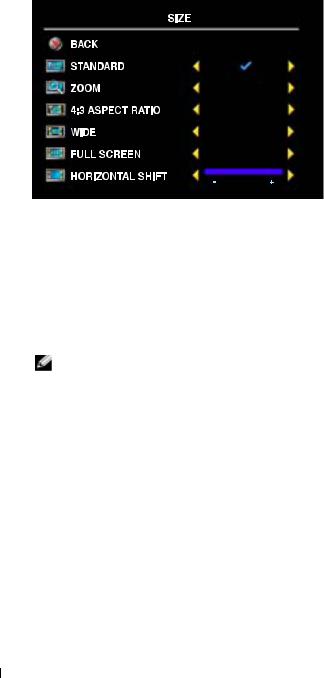
w w w . d e l l . c o m | s u p p o r t . d e l l . c o m
Size
Size allows you to adjust the appearance of the image.
Use the following settings to adjust the aspect ratio:
Standard — Best selection for viewing digital HDTV, 16:9 or 22:9 DVD movies. Zoom — Best selection for viewing TV, VCR or 4:3 DVD movie.
4:3 Aspect Ratio — Best selection for viewing TV, VCR or 4:3 DVD movie. Wide — Best selection for viewing digital HDTV, 16:9 and 22:9 DVD movies. Full Screen — Best selection for viewing digital HDTV or 16:9 DVD movies. Horizontal Shift—Adjust the horizontal placement of the image.
NOTE: Most DVDs have information about the supported aspect ratio on the case.
28 Using the TV Menu

Parental Control
Parental Control allows you to block certain channels or programs so children cannot view programs that are not age appropriate.
To enter the Parental Control menu, you need an access code. The first time you enter, use access code 3355. "Setting an Access Code" on page 29 for information on creating a new access code.
You can set the following options to block content:
•Block Control — Turns on or off all your parental control settings
•Channel Lock — Blocks selected channels
•Movie Rating — Blocks movies based on their rating (G, PG, PG-13, R, NC-17, X, and Unrated)
•TV Rating — Blocks TV shows based on their rating (TV-Y, Y7, G, PG, 14, MA, and No Rating)
NOTE: You can use Clear All to unblock the channels and programs that you have set.
Setting an Access Code
After you enter the Parental Control menu for the first time, you can set your own four-digit access code. If for any reason you lose or forget your access code, you can use the default code.
1 In the Parental Control menu, select Change Code.
2 Using the number pad on the remote control, enter a new access code. 3 Select Exit.
Using the TV Menu |
|
29 |
|
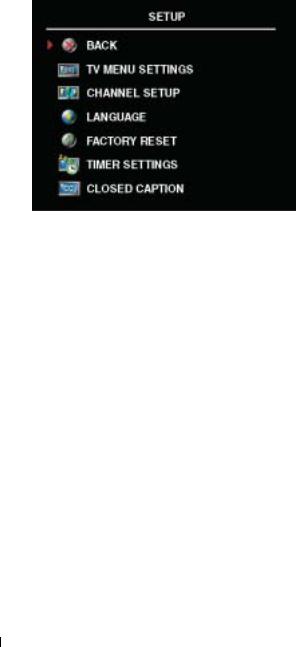
w w w . d e l l . c o m | s u p p o r t . d e l l . c o m
Setup
Setup allows you to adjust the appearance of the TV Menu, preset viewable cable channels, change the language of the TV Menu (see "Selecting Your TV Menu Language" on page 24), and to restore factory settings.
In the TV Menu Settings menu, use TV Menu Hold Time to increase or decrease the amount of time the TV Menu appears.The maximum amount of time is 60 seconds.
You can select TV Button lock to lock the buttons on the bottom panel. When this option is enabled, only the power button functions. Hold the volume up and the channel up buttons together for 10 seconds to unlock the buttons.
Channel Setup allows you adjust the settings for individual channels and preset the viewable channels. Select Antenna/Cable to select the
antenna or cable connected to your TV.
If you are using the Digital TV input source, you can preset the viewable channels. Select Channel Search to search the viewable channels. While searching the channels, press the Menu or OK button on the remote control to stop the searching. Select Channel Edit to edit the channels. If the signal is weak or distorted, select Fine Tuning to fine-tune the channel manually.
If you are using the TV IN connector, you need to preset the viewable channels for the Digital TV input source.
Timer Settings allows you to set the time which the TV turns on and off automatically. Select Closed Caption to turn on and off closed captioning and set several other CC options.
30 Using the TV Menu
